Improper Disposal of Batteries
As we create more new electronic gadgets, the need for batteries continues to rise. After the battery gets used up, it is tossed away with the rest of your trash without a second thought. Even rechargeable batteries do not last forever and must someday be thrown out. After all, there isn't some special bin for disposing of batteries. Disposing batteries incorrectly initiates a sequence of events that ultimately leads to environmental damage, which comes back to affect us, humans, negatively. With three billion batteries being thrown out each year, the effects of this cycle are only becoming more severe.
Numerous toxic chemicals are present in batteries, most notably lead, lithium, and mercury. When disposed of regularly, they end up in the massive trash heaps of landfills. The hazardous chemicals seep out of the battery and flow into the earth. Once the substances contaminate groundwater, they can make their way into the roots of growing crops and more significant water sources like creeks and rivers. This directly impacts populations of aquatic organisms, as the chemicals pose a deadly threat. Further, the substances can promptly contaminate water facilities which causes them to be found in tap water. While you may not necessarily drink tap water, you use it to wash your hands and produce, so in the end, the chemicals complete the full cycle and end up in our bodies. Additionally, chemicals found in batteries initiate landfill fires, including smoldering fires; in California, 65% of landfill fires are traced back to batteries. Smoldering fires are particularly dangerous as they produce thick toxic gas fumes and can be sustained by solid materials for a long time, making them difficult to put out. So, the harmful chemicals found in batteries also contaminate the air, contributing to global warming, and worst of all, get into our lungs.
I am definitely not the first to say that this cycle of hazardous chemicals found in disposed of objects, encroaching on our daily lives, is highly problematic. As more batteries are produced and improperly disposed of, human exposure to and ingestion of toxic chemicals through the air, and water supply will increase. With this, detrimental health impacts like cancer or neurological damages will follow.
There is a simple yet not so straightforward way to combat the effects of this cycle: recycling! Recycling batteries itself is not a complicated process; it is just that they must be transported to a proper recycling facility. However, the issue is that people are ill-informed and therefore not concerned enough with this issue. Additionally, while initiatives for battery disposal at large chain stores such as Home Depot exist, most people aren't going to make use of them. Most people are not concerned enough to make the effort of driving to a store to dispose of their batteries, or they may forget to do so. This is an area for potential solutions in getting more people's batteries properly recycled and curtail the effects of the battery disposal cycle.
Sources:
Image Credits (in order):






Comments
Post a Comment